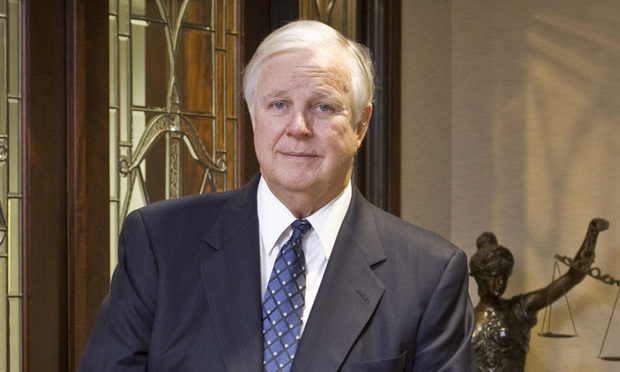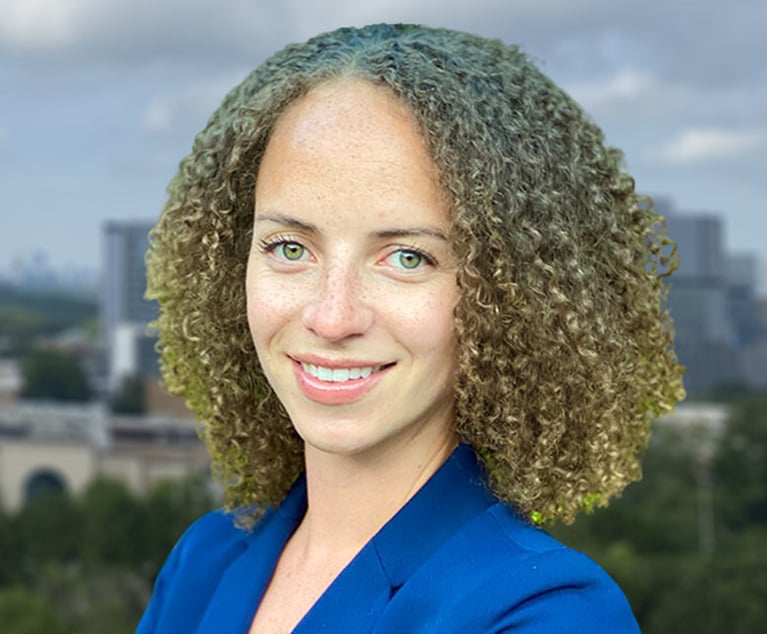Battling Cancer, Tommy Malone Is Cheered by His New Biography
The title is “Tommy Malone, Trial Lawyer: And the Light Shone Through … The Guiding Hand Shaping One of America's Greatest Trial Lawyers.” The author is Vincent Coppola, a former Newsweek reporter who has written five nonfiction books.
March 26, 2018 at 04:34 PM
4 minute read

As Atlanta trial lawyer Tommy Malone begins his 36th chemotherapy treatment Monday for the stomach cancer he has battled for nearly two years, he said he is taking a dose of encouragement from a biography of him just published by Mercer University Press.
The title is “Tommy Malone, Trial Lawyer: And the Light Shone Through… The Guiding Hand Shaping One of America's Greatest Trial Lawyers.” The author is Vincent Coppola, a former Newsweek reporter who has written five nonfiction books. His work has been featured in Atlanta Magazine, Esquire, Rolling Stone and other publications.
The cost of publishing the book has been underwritten by friends of Malone, according to a foreword penned by John Bell Jr. of Bell & Brigham in Augusta.
“There are some of us in life who are blessed with many friends, but we never know who will be there when we really, really need them,” Bell wrote. “I have never doubted that Tommy Malone is such a friend. The interviews by Vincent Coppola reveal how many others there are who feel the same way. Tommy has centered his life on what he can do for others, be they clients, friends, passing acquaintances, or worthwhile causes such as the Shepherd Center and Mercer University.”
Malone is the chairman of the Mercer board of trustees and a longtime donor to the Shepherd Center, which treats people with spinal cord and brain injuries.
The book opens with four chapters on a relatively recent case in Malone's 53-year career: a medical malpractice lawsuit on behalf of the family of Tucker Sutton, who was severely brain damaged in a difficult birth. Malone, and his son and law partner Adam Malone, tried the case twice in Cobb County Superior Court, in 2011 and 2014. Both times the jury deadlocked.
After the first trial, in which he asked for a $50 million verdict, Malone went home with a mistrial and the disclosure by jurors that they weren't convinced a doctor and hospital were responsible for the baby's birth injuries. Malone called it an expensive focus group and said he'd retry it. The book quotes the Daily Report's coverage of that trial.
The second time, the jury deadlocked again. But Malone refused to accept it. Moving between his clients and his opposing counsel on a cold January Saturday, he forged a deal to accept the jury's majority vote to trigger a previously negotiated high-low agreement. He said it was a creative solution he'd learned to use in California. Once Judge Kathryn Tanksley agreed and brought the jury in, they all learned that the 10-2 vote was in the Sutton family's favor. Malone and his wife, Debby, walked out of the courthouse with the baby in his stroller with his parents knowing they'd receive $2 million from the doctor's insurance company. They'd already received a settlement from the hospital.
Malone said last week that he has stayed in touch with Tucker Sutton's family and that his mother had produced a book herself about the case, which she titled, “Even Heroes Need a Hero.”
He said he's pleased that Coppola chose to start with Tucker Sutton and then move back to Malone's beginnings in his hometown of Albany. There, Malone worked with civil rights attorney and future Georgia Court of Appeals Judge Herbert Phipps representing people whom other white lawyers wouldn't help. He lost at first, learning hometown juries were unwilling to find fault with their own doctors. But when he teamed up with famed San Francisco plaintiffs lawyer Melvin Belli against a pharmaceutical company that made a drug that caused a young girl brain damage, everything changed.
The book's jacket says its core question is, “how a great lawyer who comes to represent important causes emerges out of the racist, paternalistic, and self-perpetuating establishment of rural Georgia in the 1950s.”
Coppola described Malone as “a lawyer whose jury awards read like Mega-Millions lottery jackpots and whose lifestyle a handbook for the rich and famous.”
Since his cancer diagnosis, Malone, now 75, has lived in his Palm Beach, Florida, home. “They couldn't do anything for me except chemo,” he said last week. “So I decided not to deal with the cold weather and the traffic in Atlanta.”
Malone said he has gained weight during treatment, thanks to his wife's care and protein shakes. “She's my Florence Nightingale,” he said. He said he has extreme fatigue, although he still goes out to dinner and has a drink, and looks forward to it. He added, “I'm still here, and they said I wouldn't be.”
This content has been archived. It is available through our partners, LexisNexis® and Bloomberg Law.
To view this content, please continue to their sites.
Not a Lexis Subscriber?
Subscribe Now
Not a Bloomberg Law Subscriber?
Subscribe Now
NOT FOR REPRINT
© 2025 ALM Global, LLC, All Rights Reserved. Request academic re-use from www.copyright.com. All other uses, submit a request to [email protected]. For more information visit Asset & Logo Licensing.
You Might Like
View All
Georgia July Bar Exam Results: Highest Overall Passing Rate in 10 Years

University of Georgia's School of Law Announces Programs to Fund More Attorneys in 'Legal Deserts'

Trending Stories
- 1SEC Files Lawsuit Against Elon Musk Over Untimely Twitter Ownership Disclosure
- 2Survey Finds Majority of Legal Professionals Still Intimidated by AI Despite Need to Streamline Mounting Caseloads
- 3FTC Launches Inquiry of Single-Family Rental Home 'Mega Investors,' Issues PBM Report
- 4Womble Bond Dickinson's Wilmington Office Sees New Leadership as Merger Is Completed
- 5Defending Against a $290M Claim and Scoring a $116M Win in Del. Drug Patent Fight
Who Got The Work
J. Brugh Lower of Gibbons has entered an appearance for industrial equipment supplier Devco Corporation in a pending trademark infringement lawsuit. The suit, accusing the defendant of selling knock-off Graco products, was filed Dec. 18 in New Jersey District Court by Rivkin Radler on behalf of Graco Inc. and Graco Minnesota. The case, assigned to U.S. District Judge Zahid N. Quraishi, is 3:24-cv-11294, Graco Inc. et al v. Devco Corporation.
Who Got The Work
Rebecca Maller-Stein and Kent A. Yalowitz of Arnold & Porter Kaye Scholer have entered their appearances for Hanaco Venture Capital and its executives, Lior Prosor and David Frankel, in a pending securities lawsuit. The action, filed on Dec. 24 in New York Southern District Court by Zell, Aron & Co. on behalf of Goldeneye Advisors, accuses the defendants of negligently and fraudulently managing the plaintiff's $1 million investment. The case, assigned to U.S. District Judge Vernon S. Broderick, is 1:24-cv-09918, Goldeneye Advisors, LLC v. Hanaco Venture Capital, Ltd. et al.
Who Got The Work
Attorneys from A&O Shearman has stepped in as defense counsel for Toronto-Dominion Bank and other defendants in a pending securities class action. The suit, filed Dec. 11 in New York Southern District Court by Bleichmar Fonti & Auld, accuses the defendants of concealing the bank's 'pervasive' deficiencies in regards to its compliance with the Bank Secrecy Act and the quality of its anti-money laundering controls. The case, assigned to U.S. District Judge Arun Subramanian, is 1:24-cv-09445, Gonzalez v. The Toronto-Dominion Bank et al.
Who Got The Work
Crown Castle International, a Pennsylvania company providing shared communications infrastructure, has turned to Luke D. Wolf of Gordon Rees Scully Mansukhani to fend off a pending breach-of-contract lawsuit. The court action, filed Nov. 25 in Michigan Eastern District Court by Hooper Hathaway PC on behalf of The Town Residences LLC, accuses Crown Castle of failing to transfer approximately $30,000 in utility payments from T-Mobile in breach of a roof-top lease and assignment agreement. The case, assigned to U.S. District Judge Susan K. Declercq, is 2:24-cv-13131, The Town Residences LLC v. T-Mobile US, Inc. et al.
Who Got The Work
Wilfred P. Coronato and Daniel M. Schwartz of McCarter & English have stepped in as defense counsel to Electrolux Home Products Inc. in a pending product liability lawsuit. The court action, filed Nov. 26 in New York Eastern District Court by Poulos Lopiccolo PC and Nagel Rice LLP on behalf of David Stern, alleges that the defendant's refrigerators’ drawers and shelving repeatedly break and fall apart within months after purchase. The case, assigned to U.S. District Judge Joan M. Azrack, is 2:24-cv-08204, Stern v. Electrolux Home Products, Inc.
Featured Firms
Law Offices of Gary Martin Hays & Associates, P.C.
(470) 294-1674
Law Offices of Mark E. Salomone
(857) 444-6468
Smith & Hassler
(713) 739-1250







